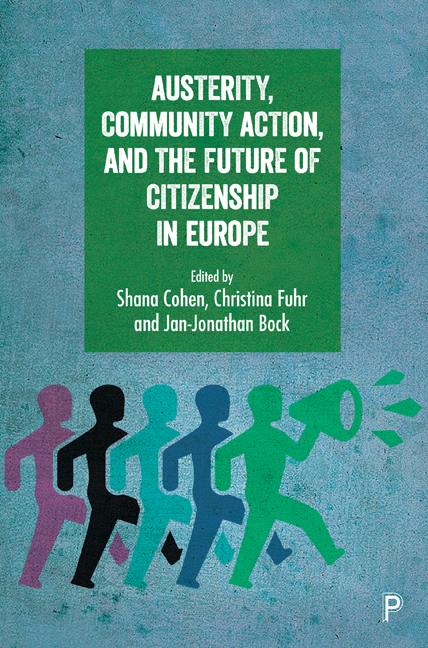Book contents
- Frontmatter
- Dedication
- Contents
- Acknowledgements
- Notes on contributors
- one Introduction: social activism, belonging and citizenship in a period of crisis
- Part I The social consequences of welfare policy
- Part II The practice of social good
- Part III Social change and neoliberalism
- Part IV Situating solidarity in perspective
- Index
Fourteen - Individualism and community in historical perspective
Published online by Cambridge University Press: 05 April 2022
- Frontmatter
- Dedication
- Contents
- Acknowledgements
- Notes on contributors
- one Introduction: social activism, belonging and citizenship in a period of crisis
- Part I The social consequences of welfare policy
- Part II The practice of social good
- Part III Social change and neoliberalism
- Part IV Situating solidarity in perspective
- Index
Summary
Across the western world, social theorists and commentators tell us that everyday life has become selfish and atomised; that individuals live only to consume; that ideas of community and social solidarity have lost their purchase. Influential social theorists like Zygmunt Bauman argue that we have entered a new age of ‘Liquid Modernity’ in which we have all been reduced to isolated individuals obsessed by our ‘solitary individual fears’ (Bauman, 2000). Similarly, Robert Putnam has captured the attention of politicians and policymakers worldwide with his bleak assessment of social fragmentation, of a world where everyone goes ‘bowling alone’ (Putnam, 2000). In Britain, we are surrounded by talk of the collapse of community and the broken society, and by think tanks and government departments constantly hatching new ways to rebuild what they have come to call our social capital. From both left and right, people argue that to halt this inexorable slide towards social disintegration we need to breathe new life into collective identities such as community and class, which supposedly once acted as a bulwark against the tide of selfish individualism. Political projects like Philip Blond's ‘red Toryism’ and Maurice Glasman's ‘blue Labour’ offer explicitly backward-looking programmes that champion the revival of face-to-face community as an alternative to the fragmentation they attribute to modern-day liberal individualism (Blond, 2010; Glasman et al, 2011). More radical voices call for the revival of class politics as the only way to halt our inexorable slide towards an atomised, freemarket dystopia (Jones, 2011; Dorling, 2014).
But we should be wary. The social transformations of the past half century have brought enormous gains in terms of personal freedom. The social pressure to conform to external norms of behaviour – the pressure, as Jeanette Winterson puts it, to be normal rather than happy – has weakened across the western world (and beyond) in the past half century, eroded both from within and without (Winterson, 2011): from without, by increased mobility, new mass media and the hollowing out of patrician power in state and church, and from within, by rising expectations of life driven by direct personal experience – by people seeing others forge lives not just different from, but palpably better than, the life proscribed by custom and habit (Hoggart, 1995).
- Type
- Chapter
- Information
- Austerity Community Action and the Future of Citizenship , pp. 239 - 254Publisher: Bristol University PressPrint publication year: 2017

